Corporate Law: Mechanism and Legal Provisions for Companies
VerifiedAdded on 2023/01/13
|9
|2532
|50
AI Summary
This report provides an overview of corporate law and its application to companies. It discusses the rights and responsibilities of directors, the validity of contracts made by companies, and the indoor management rule. The report highlights relevant sections of the Corporations Act, 2001 and includes case examples to illustrate key concepts.
Contribute Materials
Your contribution can guide someone’s learning journey. Share your
documents today.
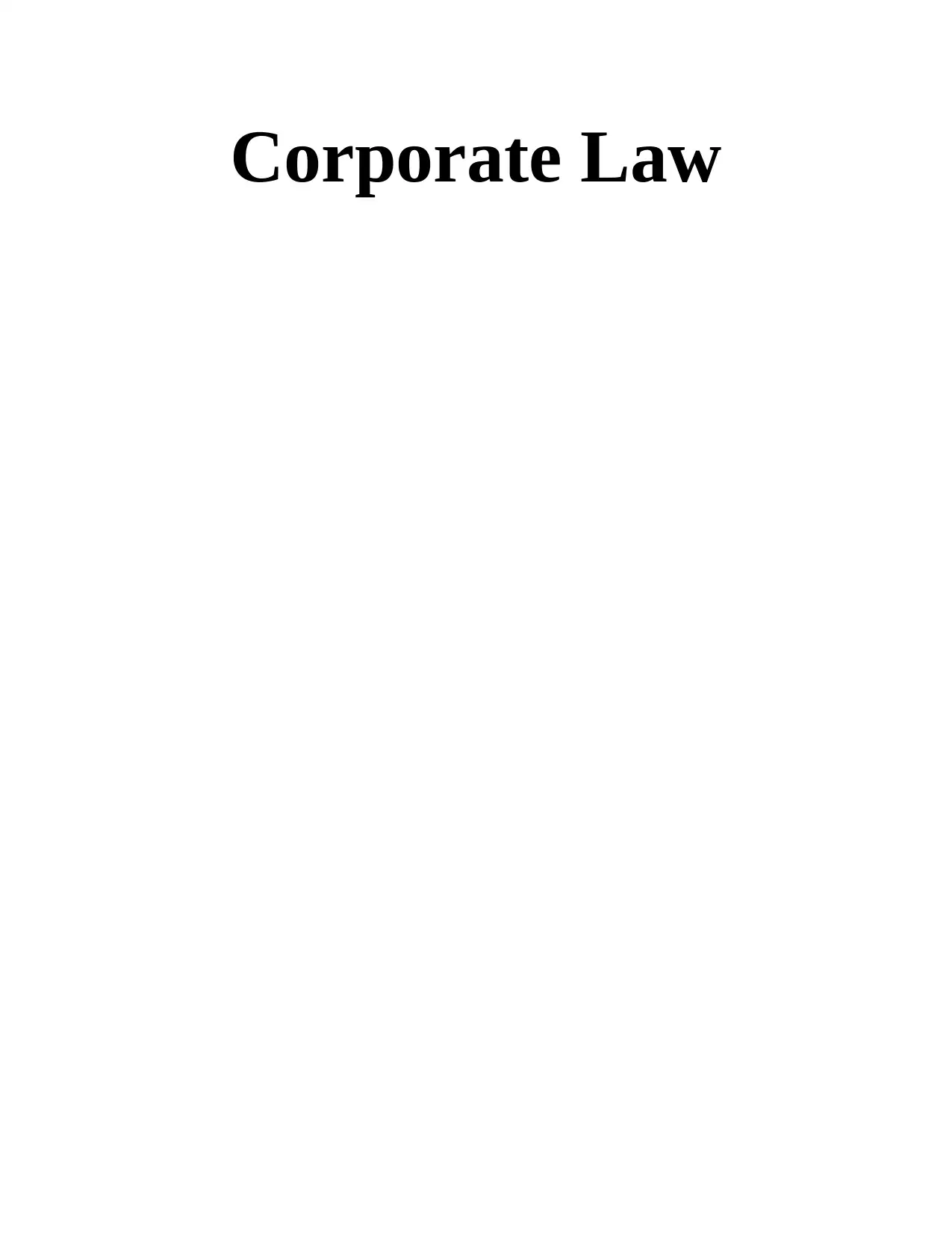
Corporate Law
Secure Best Marks with AI Grader
Need help grading? Try our AI Grader for instant feedback on your assignments.
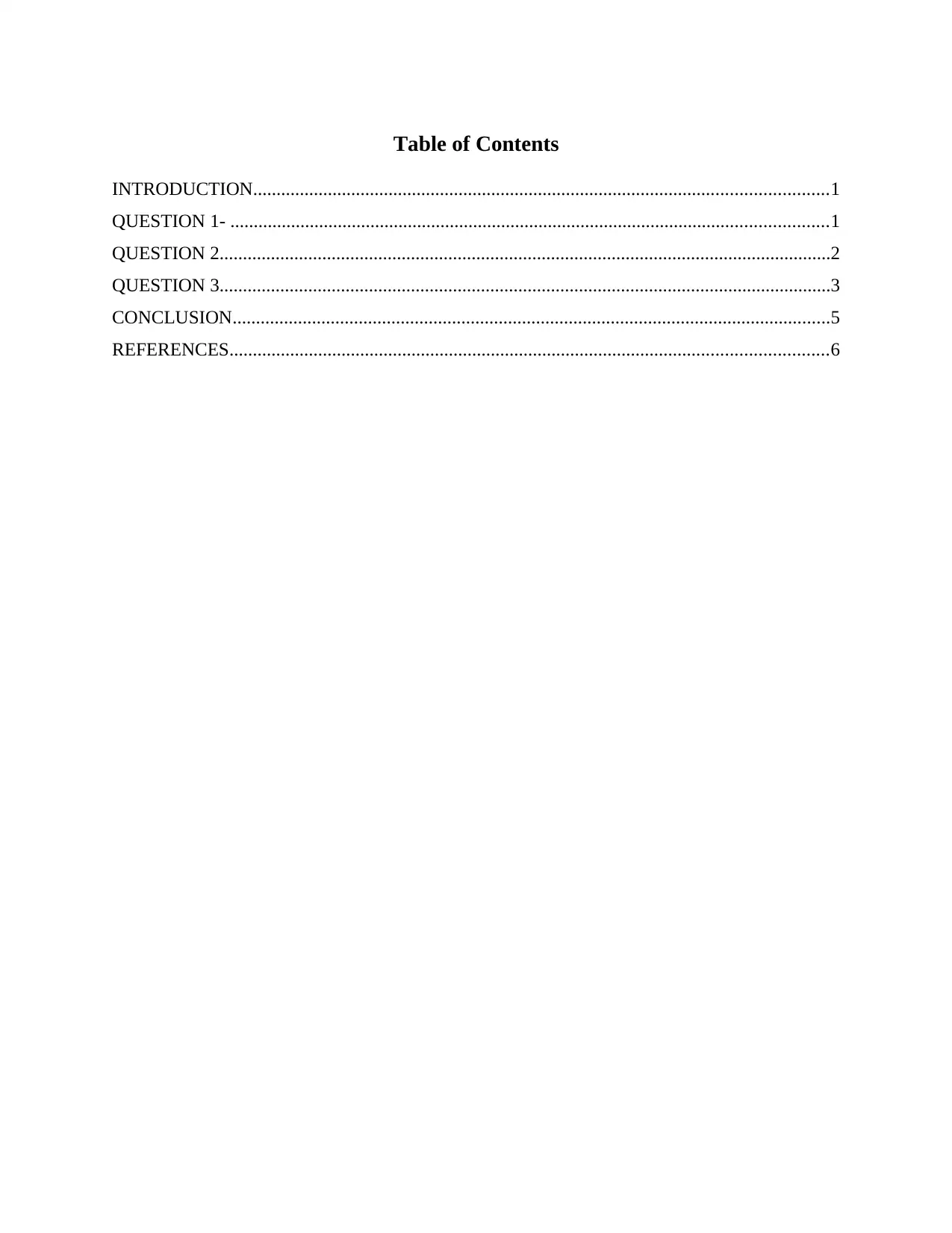
Table of Contents
INTRODUCTION...........................................................................................................................1
QUESTION 1- ................................................................................................................................1
QUESTION 2...................................................................................................................................2
QUESTION 3...................................................................................................................................3
CONCLUSION................................................................................................................................5
REFERENCES................................................................................................................................6
INTRODUCTION...........................................................................................................................1
QUESTION 1- ................................................................................................................................1
QUESTION 2...................................................................................................................................2
QUESTION 3...................................................................................................................................3
CONCLUSION................................................................................................................................5
REFERENCES................................................................................................................................6
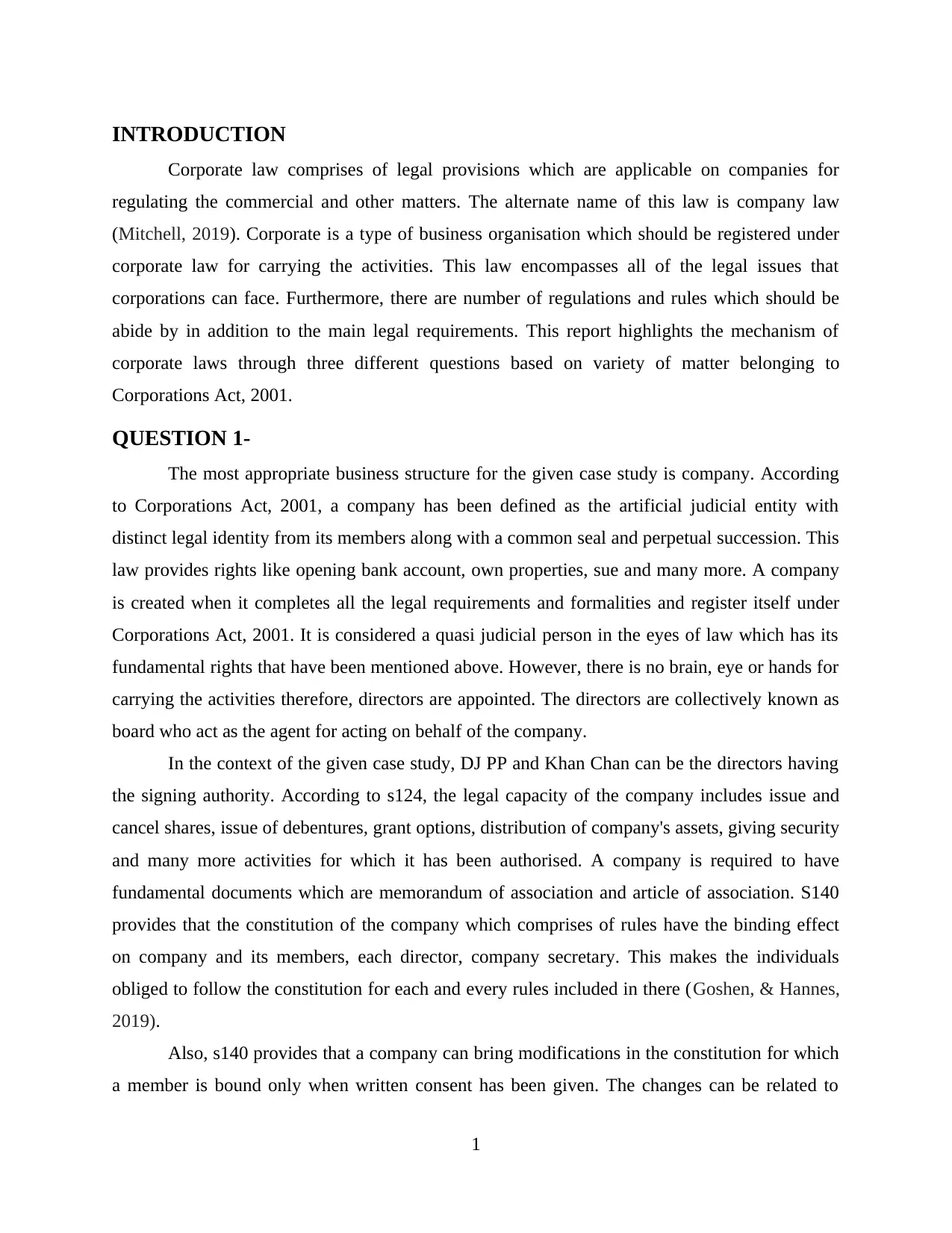
INTRODUCTION
Corporate law comprises of legal provisions which are applicable on companies for
regulating the commercial and other matters. The alternate name of this law is company law
(Mitchell, 2019). Corporate is a type of business organisation which should be registered under
corporate law for carrying the activities. This law encompasses all of the legal issues that
corporations can face. Furthermore, there are number of regulations and rules which should be
abide by in addition to the main legal requirements. This report highlights the mechanism of
corporate laws through three different questions based on variety of matter belonging to
Corporations Act, 2001.
QUESTION 1-
The most appropriate business structure for the given case study is company. According
to Corporations Act, 2001, a company has been defined as the artificial judicial entity with
distinct legal identity from its members along with a common seal and perpetual succession. This
law provides rights like opening bank account, own properties, sue and many more. A company
is created when it completes all the legal requirements and formalities and register itself under
Corporations Act, 2001. It is considered a quasi judicial person in the eyes of law which has its
fundamental rights that have been mentioned above. However, there is no brain, eye or hands for
carrying the activities therefore, directors are appointed. The directors are collectively known as
board who act as the agent for acting on behalf of the company.
In the context of the given case study, DJ PP and Khan Chan can be the directors having
the signing authority. According to s124, the legal capacity of the company includes issue and
cancel shares, issue of debentures, grant options, distribution of company's assets, giving security
and many more activities for which it has been authorised. A company is required to have
fundamental documents which are memorandum of association and article of association. S140
provides that the constitution of the company which comprises of rules have the binding effect
on company and its members, each director, company secretary. This makes the individuals
obliged to follow the constitution for each and every rules included in there (Goshen, & Hannes,
2019).
Also, s140 provides that a company can bring modifications in the constitution for which
a member is bound only when written consent has been given. The changes can be related to
1
Corporate law comprises of legal provisions which are applicable on companies for
regulating the commercial and other matters. The alternate name of this law is company law
(Mitchell, 2019). Corporate is a type of business organisation which should be registered under
corporate law for carrying the activities. This law encompasses all of the legal issues that
corporations can face. Furthermore, there are number of regulations and rules which should be
abide by in addition to the main legal requirements. This report highlights the mechanism of
corporate laws through three different questions based on variety of matter belonging to
Corporations Act, 2001.
QUESTION 1-
The most appropriate business structure for the given case study is company. According
to Corporations Act, 2001, a company has been defined as the artificial judicial entity with
distinct legal identity from its members along with a common seal and perpetual succession. This
law provides rights like opening bank account, own properties, sue and many more. A company
is created when it completes all the legal requirements and formalities and register itself under
Corporations Act, 2001. It is considered a quasi judicial person in the eyes of law which has its
fundamental rights that have been mentioned above. However, there is no brain, eye or hands for
carrying the activities therefore, directors are appointed. The directors are collectively known as
board who act as the agent for acting on behalf of the company.
In the context of the given case study, DJ PP and Khan Chan can be the directors having
the signing authority. According to s124, the legal capacity of the company includes issue and
cancel shares, issue of debentures, grant options, distribution of company's assets, giving security
and many more activities for which it has been authorised. A company is required to have
fundamental documents which are memorandum of association and article of association. S140
provides that the constitution of the company which comprises of rules have the binding effect
on company and its members, each director, company secretary. This makes the individuals
obliged to follow the constitution for each and every rules included in there (Goshen, & Hannes,
2019).
Also, s140 provides that a company can bring modifications in the constitution for which
a member is bound only when written consent has been given. The changes can be related to
1
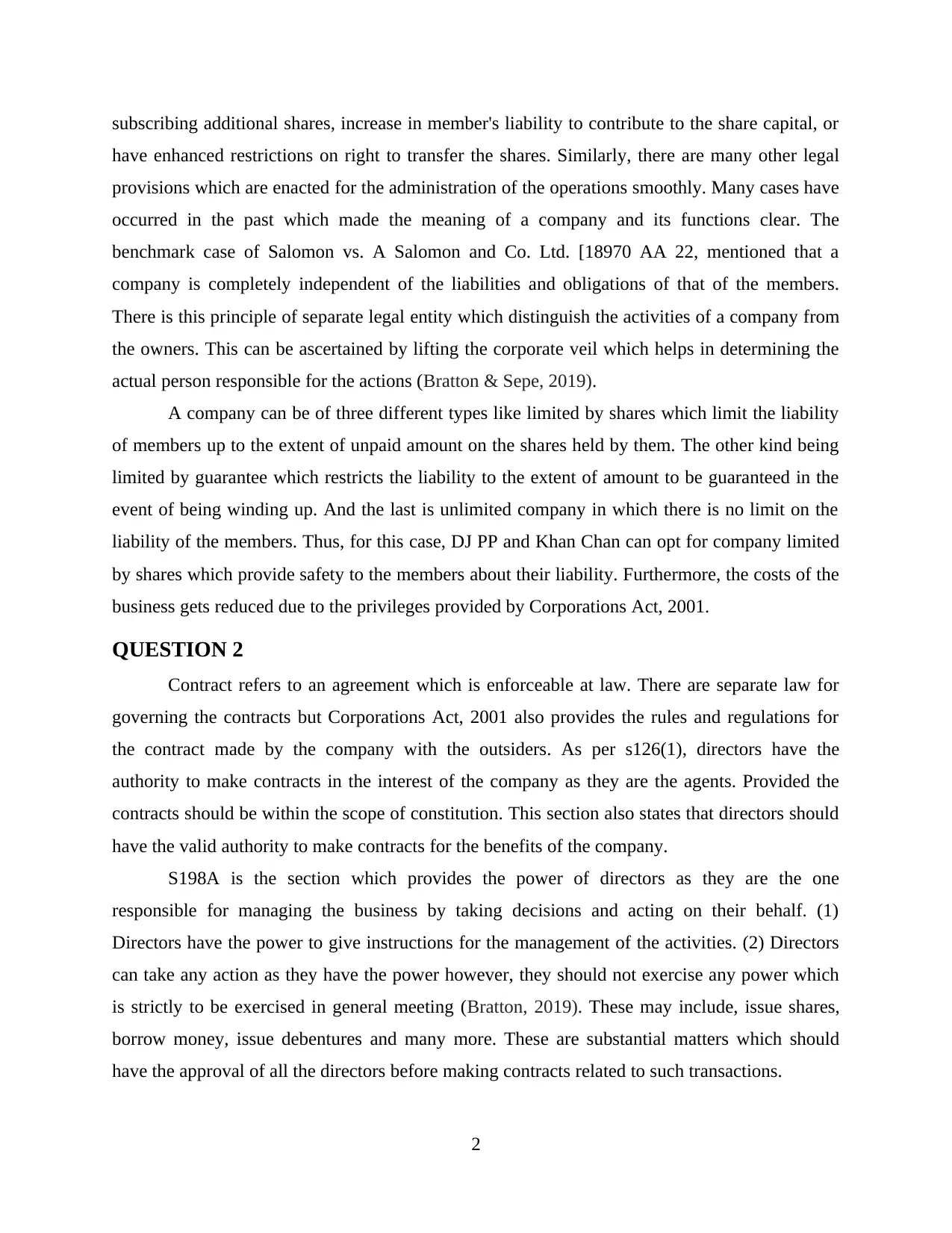
subscribing additional shares, increase in member's liability to contribute to the share capital, or
have enhanced restrictions on right to transfer the shares. Similarly, there are many other legal
provisions which are enacted for the administration of the operations smoothly. Many cases have
occurred in the past which made the meaning of a company and its functions clear. The
benchmark case of Salomon vs. A Salomon and Co. Ltd. [18970 AA 22, mentioned that a
company is completely independent of the liabilities and obligations of that of the members.
There is this principle of separate legal entity which distinguish the activities of a company from
the owners. This can be ascertained by lifting the corporate veil which helps in determining the
actual person responsible for the actions (Bratton & Sepe, 2019).
A company can be of three different types like limited by shares which limit the liability
of members up to the extent of unpaid amount on the shares held by them. The other kind being
limited by guarantee which restricts the liability to the extent of amount to be guaranteed in the
event of being winding up. And the last is unlimited company in which there is no limit on the
liability of the members. Thus, for this case, DJ PP and Khan Chan can opt for company limited
by shares which provide safety to the members about their liability. Furthermore, the costs of the
business gets reduced due to the privileges provided by Corporations Act, 2001.
QUESTION 2
Contract refers to an agreement which is enforceable at law. There are separate law for
governing the contracts but Corporations Act, 2001 also provides the rules and regulations for
the contract made by the company with the outsiders. As per s126(1), directors have the
authority to make contracts in the interest of the company as they are the agents. Provided the
contracts should be within the scope of constitution. This section also states that directors should
have the valid authority to make contracts for the benefits of the company.
S198A is the section which provides the power of directors as they are the one
responsible for managing the business by taking decisions and acting on their behalf. (1)
Directors have the power to give instructions for the management of the activities. (2) Directors
can take any action as they have the power however, they should not exercise any power which
is strictly to be exercised in general meeting (Bratton, 2019). These may include, issue shares,
borrow money, issue debentures and many more. These are substantial matters which should
have the approval of all the directors before making contracts related to such transactions.
2
have enhanced restrictions on right to transfer the shares. Similarly, there are many other legal
provisions which are enacted for the administration of the operations smoothly. Many cases have
occurred in the past which made the meaning of a company and its functions clear. The
benchmark case of Salomon vs. A Salomon and Co. Ltd. [18970 AA 22, mentioned that a
company is completely independent of the liabilities and obligations of that of the members.
There is this principle of separate legal entity which distinguish the activities of a company from
the owners. This can be ascertained by lifting the corporate veil which helps in determining the
actual person responsible for the actions (Bratton & Sepe, 2019).
A company can be of three different types like limited by shares which limit the liability
of members up to the extent of unpaid amount on the shares held by them. The other kind being
limited by guarantee which restricts the liability to the extent of amount to be guaranteed in the
event of being winding up. And the last is unlimited company in which there is no limit on the
liability of the members. Thus, for this case, DJ PP and Khan Chan can opt for company limited
by shares which provide safety to the members about their liability. Furthermore, the costs of the
business gets reduced due to the privileges provided by Corporations Act, 2001.
QUESTION 2
Contract refers to an agreement which is enforceable at law. There are separate law for
governing the contracts but Corporations Act, 2001 also provides the rules and regulations for
the contract made by the company with the outsiders. As per s126(1), directors have the
authority to make contracts in the interest of the company as they are the agents. Provided the
contracts should be within the scope of constitution. This section also states that directors should
have the valid authority to make contracts for the benefits of the company.
S198A is the section which provides the power of directors as they are the one
responsible for managing the business by taking decisions and acting on their behalf. (1)
Directors have the power to give instructions for the management of the activities. (2) Directors
can take any action as they have the power however, they should not exercise any power which
is strictly to be exercised in general meeting (Bratton, 2019). These may include, issue shares,
borrow money, issue debentures and many more. These are substantial matters which should
have the approval of all the directors before making contracts related to such transactions.
2
Secure Best Marks with AI Grader
Need help grading? Try our AI Grader for instant feedback on your assignments.
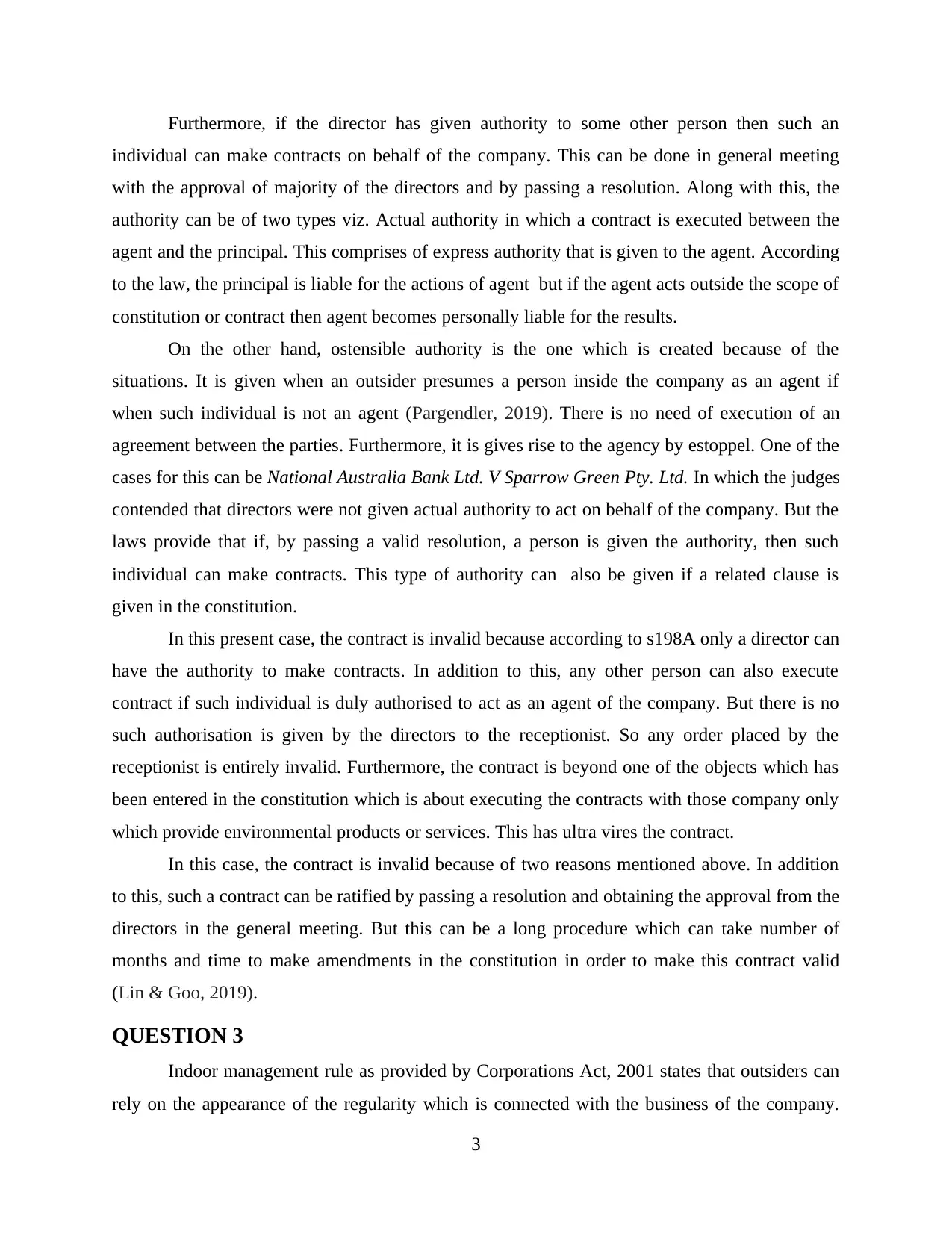
Furthermore, if the director has given authority to some other person then such an
individual can make contracts on behalf of the company. This can be done in general meeting
with the approval of majority of the directors and by passing a resolution. Along with this, the
authority can be of two types viz. Actual authority in which a contract is executed between the
agent and the principal. This comprises of express authority that is given to the agent. According
to the law, the principal is liable for the actions of agent but if the agent acts outside the scope of
constitution or contract then agent becomes personally liable for the results.
On the other hand, ostensible authority is the one which is created because of the
situations. It is given when an outsider presumes a person inside the company as an agent if
when such individual is not an agent (Pargendler, 2019). There is no need of execution of an
agreement between the parties. Furthermore, it is gives rise to the agency by estoppel. One of the
cases for this can be National Australia Bank Ltd. V Sparrow Green Pty. Ltd. In which the judges
contended that directors were not given actual authority to act on behalf of the company. But the
laws provide that if, by passing a valid resolution, a person is given the authority, then such
individual can make contracts. This type of authority can also be given if a related clause is
given in the constitution.
In this present case, the contract is invalid because according to s198A only a director can
have the authority to make contracts. In addition to this, any other person can also execute
contract if such individual is duly authorised to act as an agent of the company. But there is no
such authorisation is given by the directors to the receptionist. So any order placed by the
receptionist is entirely invalid. Furthermore, the contract is beyond one of the objects which has
been entered in the constitution which is about executing the contracts with those company only
which provide environmental products or services. This has ultra vires the contract.
In this case, the contract is invalid because of two reasons mentioned above. In addition
to this, such a contract can be ratified by passing a resolution and obtaining the approval from the
directors in the general meeting. But this can be a long procedure which can take number of
months and time to make amendments in the constitution in order to make this contract valid
(Lin & Goo, 2019).
QUESTION 3
Indoor management rule as provided by Corporations Act, 2001 states that outsiders can
rely on the appearance of the regularity which is connected with the business of the company.
3
individual can make contracts on behalf of the company. This can be done in general meeting
with the approval of majority of the directors and by passing a resolution. Along with this, the
authority can be of two types viz. Actual authority in which a contract is executed between the
agent and the principal. This comprises of express authority that is given to the agent. According
to the law, the principal is liable for the actions of agent but if the agent acts outside the scope of
constitution or contract then agent becomes personally liable for the results.
On the other hand, ostensible authority is the one which is created because of the
situations. It is given when an outsider presumes a person inside the company as an agent if
when such individual is not an agent (Pargendler, 2019). There is no need of execution of an
agreement between the parties. Furthermore, it is gives rise to the agency by estoppel. One of the
cases for this can be National Australia Bank Ltd. V Sparrow Green Pty. Ltd. In which the judges
contended that directors were not given actual authority to act on behalf of the company. But the
laws provide that if, by passing a valid resolution, a person is given the authority, then such
individual can make contracts. This type of authority can also be given if a related clause is
given in the constitution.
In this present case, the contract is invalid because according to s198A only a director can
have the authority to make contracts. In addition to this, any other person can also execute
contract if such individual is duly authorised to act as an agent of the company. But there is no
such authorisation is given by the directors to the receptionist. So any order placed by the
receptionist is entirely invalid. Furthermore, the contract is beyond one of the objects which has
been entered in the constitution which is about executing the contracts with those company only
which provide environmental products or services. This has ultra vires the contract.
In this case, the contract is invalid because of two reasons mentioned above. In addition
to this, such a contract can be ratified by passing a resolution and obtaining the approval from the
directors in the general meeting. But this can be a long procedure which can take number of
months and time to make amendments in the constitution in order to make this contract valid
(Lin & Goo, 2019).
QUESTION 3
Indoor management rule as provided by Corporations Act, 2001 states that outsiders can
rely on the appearance of the regularity which is connected with the business of the company.
3
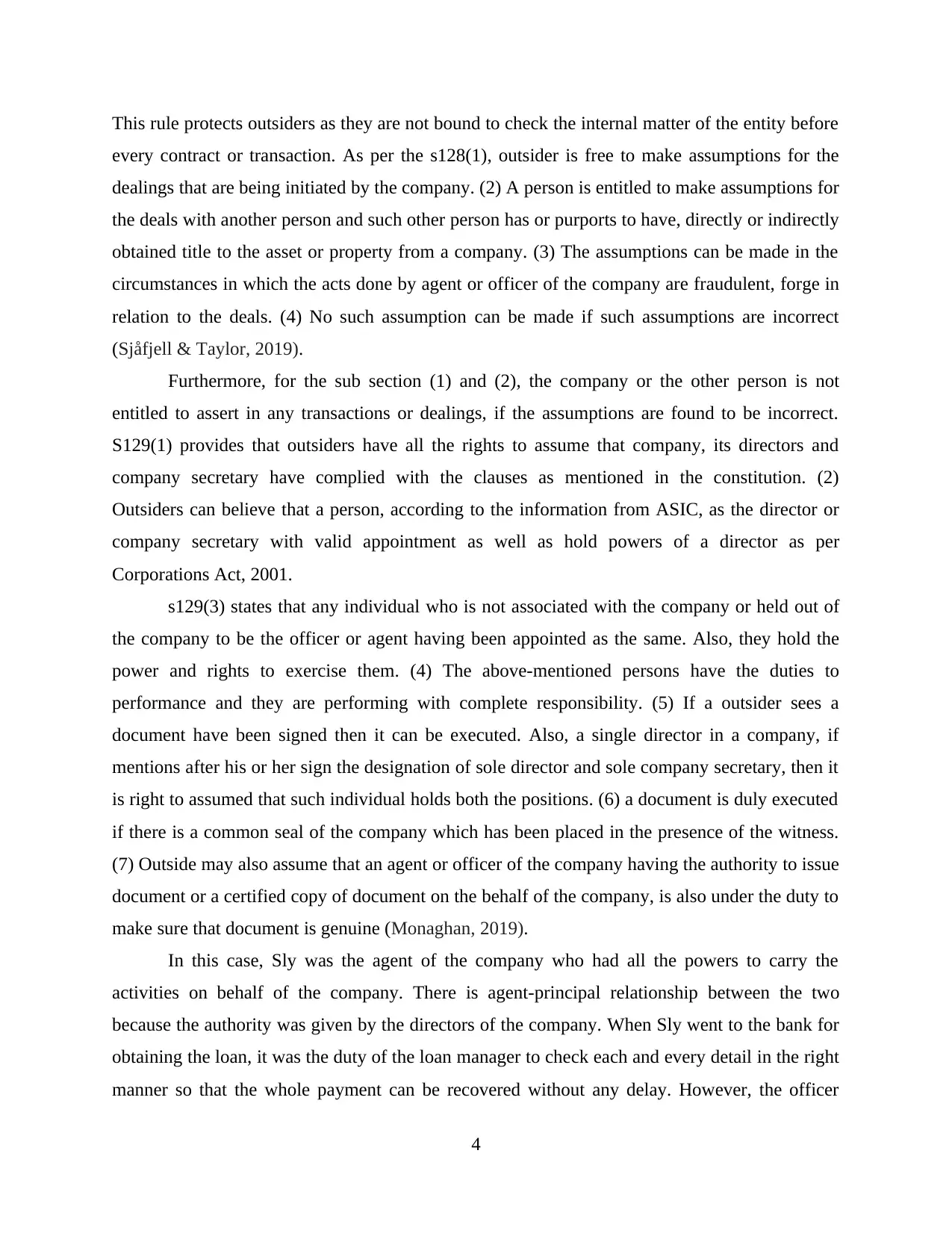
This rule protects outsiders as they are not bound to check the internal matter of the entity before
every contract or transaction. As per the s128(1), outsider is free to make assumptions for the
dealings that are being initiated by the company. (2) A person is entitled to make assumptions for
the deals with another person and such other person has or purports to have, directly or indirectly
obtained title to the asset or property from a company. (3) The assumptions can be made in the
circumstances in which the acts done by agent or officer of the company are fraudulent, forge in
relation to the deals. (4) No such assumption can be made if such assumptions are incorrect
(Sjåfjell & Taylor, 2019).
Furthermore, for the sub section (1) and (2), the company or the other person is not
entitled to assert in any transactions or dealings, if the assumptions are found to be incorrect.
S129(1) provides that outsiders have all the rights to assume that company, its directors and
company secretary have complied with the clauses as mentioned in the constitution. (2)
Outsiders can believe that a person, according to the information from ASIC, as the director or
company secretary with valid appointment as well as hold powers of a director as per
Corporations Act, 2001.
s129(3) states that any individual who is not associated with the company or held out of
the company to be the officer or agent having been appointed as the same. Also, they hold the
power and rights to exercise them. (4) The above-mentioned persons have the duties to
performance and they are performing with complete responsibility. (5) If a outsider sees a
document have been signed then it can be executed. Also, a single director in a company, if
mentions after his or her sign the designation of sole director and sole company secretary, then it
is right to assumed that such individual holds both the positions. (6) a document is duly executed
if there is a common seal of the company which has been placed in the presence of the witness.
(7) Outside may also assume that an agent or officer of the company having the authority to issue
document or a certified copy of document on the behalf of the company, is also under the duty to
make sure that document is genuine (Monaghan, 2019).
In this case, Sly was the agent of the company who had all the powers to carry the
activities on behalf of the company. There is agent-principal relationship between the two
because the authority was given by the directors of the company. When Sly went to the bank for
obtaining the loan, it was the duty of the loan manager to check each and every detail in the right
manner so that the whole payment can be recovered without any delay. However, the officer
4
every contract or transaction. As per the s128(1), outsider is free to make assumptions for the
dealings that are being initiated by the company. (2) A person is entitled to make assumptions for
the deals with another person and such other person has or purports to have, directly or indirectly
obtained title to the asset or property from a company. (3) The assumptions can be made in the
circumstances in which the acts done by agent or officer of the company are fraudulent, forge in
relation to the deals. (4) No such assumption can be made if such assumptions are incorrect
(Sjåfjell & Taylor, 2019).
Furthermore, for the sub section (1) and (2), the company or the other person is not
entitled to assert in any transactions or dealings, if the assumptions are found to be incorrect.
S129(1) provides that outsiders have all the rights to assume that company, its directors and
company secretary have complied with the clauses as mentioned in the constitution. (2)
Outsiders can believe that a person, according to the information from ASIC, as the director or
company secretary with valid appointment as well as hold powers of a director as per
Corporations Act, 2001.
s129(3) states that any individual who is not associated with the company or held out of
the company to be the officer or agent having been appointed as the same. Also, they hold the
power and rights to exercise them. (4) The above-mentioned persons have the duties to
performance and they are performing with complete responsibility. (5) If a outsider sees a
document have been signed then it can be executed. Also, a single director in a company, if
mentions after his or her sign the designation of sole director and sole company secretary, then it
is right to assumed that such individual holds both the positions. (6) a document is duly executed
if there is a common seal of the company which has been placed in the presence of the witness.
(7) Outside may also assume that an agent or officer of the company having the authority to issue
document or a certified copy of document on the behalf of the company, is also under the duty to
make sure that document is genuine (Monaghan, 2019).
In this case, Sly was the agent of the company who had all the powers to carry the
activities on behalf of the company. There is agent-principal relationship between the two
because the authority was given by the directors of the company. When Sly went to the bank for
obtaining the loan, it was the duty of the loan manager to check each and every detail in the right
manner so that the whole payment can be recovered without any delay. However, the officer
4
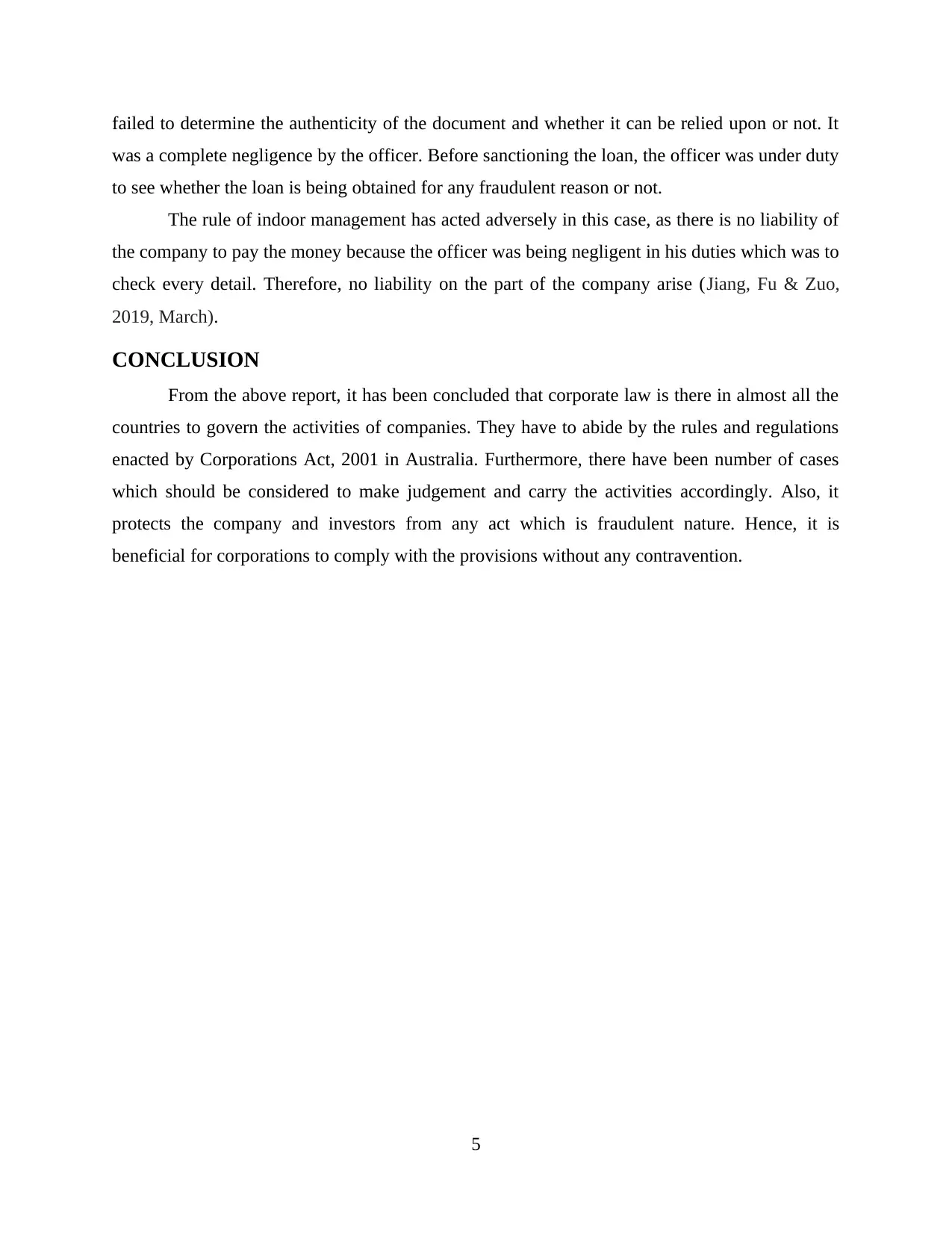
failed to determine the authenticity of the document and whether it can be relied upon or not. It
was a complete negligence by the officer. Before sanctioning the loan, the officer was under duty
to see whether the loan is being obtained for any fraudulent reason or not.
The rule of indoor management has acted adversely in this case, as there is no liability of
the company to pay the money because the officer was being negligent in his duties which was to
check every detail. Therefore, no liability on the part of the company arise (Jiang, Fu & Zuo,
2019, March).
CONCLUSION
From the above report, it has been concluded that corporate law is there in almost all the
countries to govern the activities of companies. They have to abide by the rules and regulations
enacted by Corporations Act, 2001 in Australia. Furthermore, there have been number of cases
which should be considered to make judgement and carry the activities accordingly. Also, it
protects the company and investors from any act which is fraudulent nature. Hence, it is
beneficial for corporations to comply with the provisions without any contravention.
5
was a complete negligence by the officer. Before sanctioning the loan, the officer was under duty
to see whether the loan is being obtained for any fraudulent reason or not.
The rule of indoor management has acted adversely in this case, as there is no liability of
the company to pay the money because the officer was being negligent in his duties which was to
check every detail. Therefore, no liability on the part of the company arise (Jiang, Fu & Zuo,
2019, March).
CONCLUSION
From the above report, it has been concluded that corporate law is there in almost all the
countries to govern the activities of companies. They have to abide by the rules and regulations
enacted by Corporations Act, 2001 in Australia. Furthermore, there have been number of cases
which should be considered to make judgement and carry the activities accordingly. Also, it
protects the company and investors from any act which is fraudulent nature. Hence, it is
beneficial for corporations to comply with the provisions without any contravention.
5
Paraphrase This Document
Need a fresh take? Get an instant paraphrase of this document with our AI Paraphraser
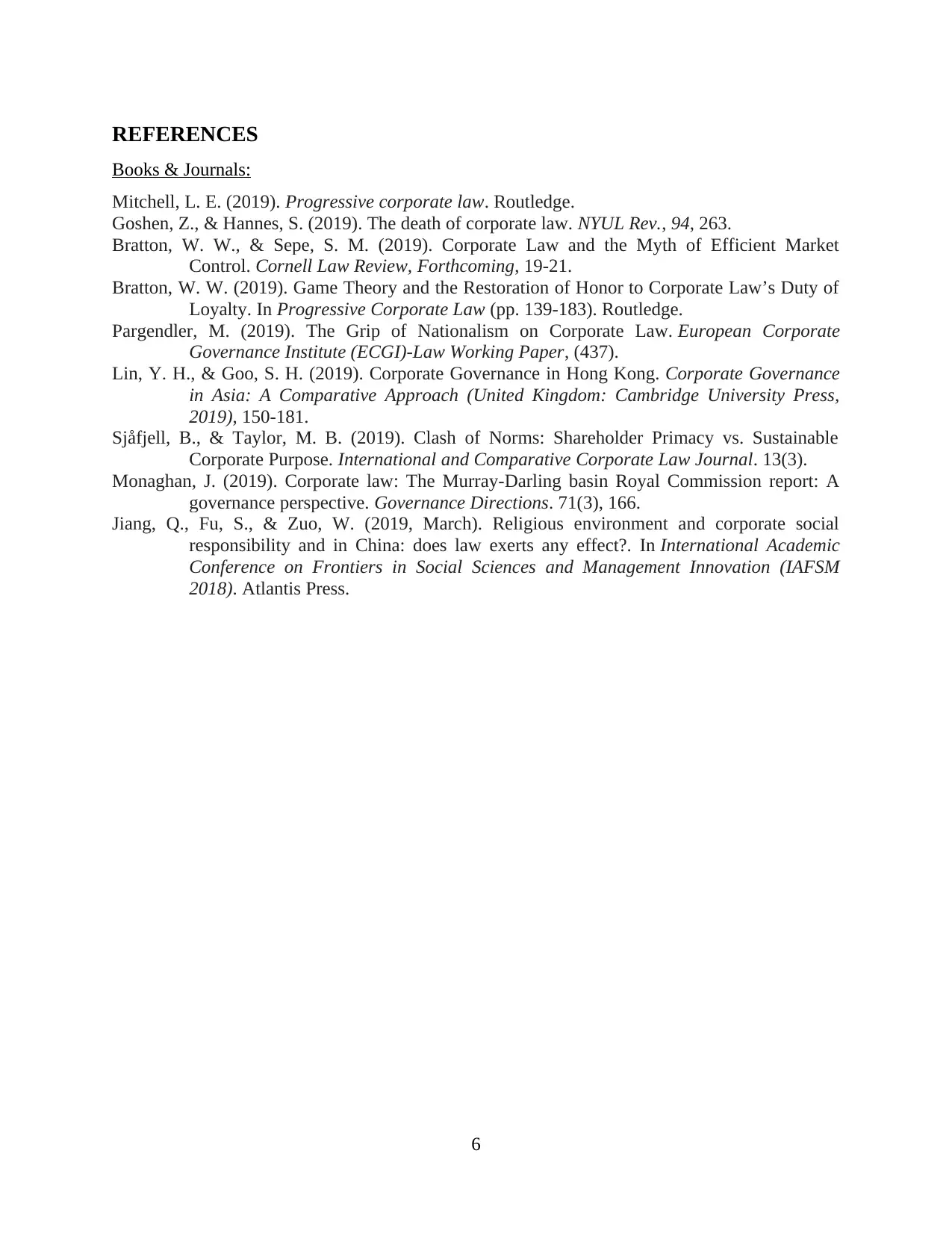
REFERENCES
Books & Journals:
Mitchell, L. E. (2019). Progressive corporate law. Routledge.
Goshen, Z., & Hannes, S. (2019). The death of corporate law. NYUL Rev., 94, 263.
Bratton, W. W., & Sepe, S. M. (2019). Corporate Law and the Myth of Efficient Market
Control. Cornell Law Review, Forthcoming, 19-21.
Bratton, W. W. (2019). Game Theory and the Restoration of Honor to Corporate Law’s Duty of
Loyalty. In Progressive Corporate Law (pp. 139-183). Routledge.
Pargendler, M. (2019). The Grip of Nationalism on Corporate Law. European Corporate
Governance Institute (ECGI)-Law Working Paper, (437).
Lin, Y. H., & Goo, S. H. (2019). Corporate Governance in Hong Kong. Corporate Governance
in Asia: A Comparative Approach (United Kingdom: Cambridge University Press,
2019), 150-181.
Sjåfjell, B., & Taylor, M. B. (2019). Clash of Norms: Shareholder Primacy vs. Sustainable
Corporate Purpose. International and Comparative Corporate Law Journal. 13(3).
Monaghan, J. (2019). Corporate law: The Murray-Darling basin Royal Commission report: A
governance perspective. Governance Directions. 71(3), 166.
Jiang, Q., Fu, S., & Zuo, W. (2019, March). Religious environment and corporate social
responsibility and in China: does law exerts any effect?. In International Academic
Conference on Frontiers in Social Sciences and Management Innovation (IAFSM
2018). Atlantis Press.
6
Books & Journals:
Mitchell, L. E. (2019). Progressive corporate law. Routledge.
Goshen, Z., & Hannes, S. (2019). The death of corporate law. NYUL Rev., 94, 263.
Bratton, W. W., & Sepe, S. M. (2019). Corporate Law and the Myth of Efficient Market
Control. Cornell Law Review, Forthcoming, 19-21.
Bratton, W. W. (2019). Game Theory and the Restoration of Honor to Corporate Law’s Duty of
Loyalty. In Progressive Corporate Law (pp. 139-183). Routledge.
Pargendler, M. (2019). The Grip of Nationalism on Corporate Law. European Corporate
Governance Institute (ECGI)-Law Working Paper, (437).
Lin, Y. H., & Goo, S. H. (2019). Corporate Governance in Hong Kong. Corporate Governance
in Asia: A Comparative Approach (United Kingdom: Cambridge University Press,
2019), 150-181.
Sjåfjell, B., & Taylor, M. B. (2019). Clash of Norms: Shareholder Primacy vs. Sustainable
Corporate Purpose. International and Comparative Corporate Law Journal. 13(3).
Monaghan, J. (2019). Corporate law: The Murray-Darling basin Royal Commission report: A
governance perspective. Governance Directions. 71(3), 166.
Jiang, Q., Fu, S., & Zuo, W. (2019, March). Religious environment and corporate social
responsibility and in China: does law exerts any effect?. In International Academic
Conference on Frontiers in Social Sciences and Management Innovation (IAFSM
2018). Atlantis Press.
6

7
1 out of 9
Related Documents
Your All-in-One AI-Powered Toolkit for Academic Success.
+13062052269
info@desklib.com
Available 24*7 on WhatsApp / Email
![[object Object]](/_next/static/media/star-bottom.7253800d.svg)
Unlock your academic potential
© 2024 | Zucol Services PVT LTD | All rights reserved.





